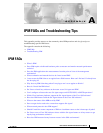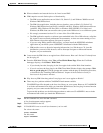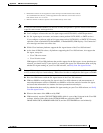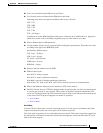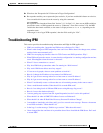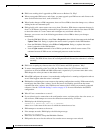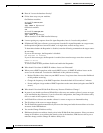
A-9
User Guide for Internetwork Performance Monitor
OL-11291-01
Appendix A IPM FAQs and Troubleshooting Tips
IPM FAQs
Q.
Can I use a firewall between IPM server and client?
A.
Yes, firewall can be used between the IPM Server and client.
Following ports need to be opened for IPM to work across a firewall.
TCP 1741
TCP 9088
TCP 1783
TCP 1784
TCP 443 (https)
In addition, to use the IPM Standalone client across a firewall, the UseGKStandalone
property in
{IPM client install dir}\classes\IPM_ConfigMain.properties file must be set to
Yes.
Q.
What is Request Size in IPM operation?
A.
It is the number of bytes used as a payload while sending the request packet. The header size varies
according to the type of the RTR/SAA probe.
Overhead by different layers:
TCP Layer - 20 bytes.
UDP Layer - 8 bytes.
IP Layer - 20 to 60 bytes.
ICMP Layer - 8 bytes.
RTR/SAA - 8 bytes.
Q.
What are the port numbers used by IPM?
A.
IPM uses these ports:
Port 44342 is used by osagent
Port 44341 is used for database connection
Port 9088 is used for Visibroker gatekeeper connection
Ports 9192, 1783, 9191, 9193, 9194, and 1784 are used for client-server communication.
Q.
What is the difference between Active and Passive FTP session modes?
A.
The File Transfer Protocol (FTP) has multiple modes of operation that can affect its operation and,
as a result, the security of your network. These modes of operation determine whether the FTP
server or FTP client initiates the TCP connections that are used to send information from the server
to the client. The FTP protocol supports two modes of operation:
• Active Mode
• Passive Mode
Active Mode
In active FTP, the client opens a control connection on port 21 to the server, and whenever the client
requests data from the server, the server opens a TCP session on port 20.
The active mode of operation is less secure than the passive mode. This mode of operation complicates
the construction of firewalls, because the firewall must anticipate the connection from the FTP server
back to the client program.



